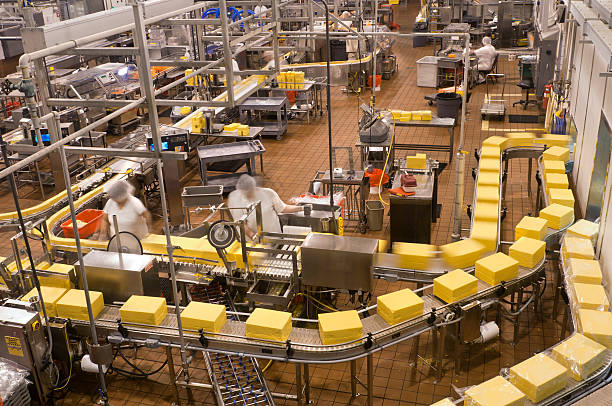A Comprehensive Appearance at Cheese Manufacturing: Components, Approaches, and the Future of Craftsmen Cheeses
The detailed procedure of cheese production is an interesting convergence of art and science, where top quality milk, rennet, and certain microbial cultures serve as foundational aspects. As the industry progressively focuses on sustainability and openness, the future of artisan cheeses promises to show both heritage and progress.
Secret Active Ingredients in Cheese Production
A range of vital active ingredients play a critical function in cheese manufacturing, each contributing to the end product's taste, texture, and character. The primary active ingredient in cheese is milk, which can come from various resources, including cows, goats, and sheep - cheese shop melbourne. The sort of milk made use of considerably influences the cheese's taste and consistency; for example, cow's milk usually generates creamier cheeses, while goat's milk commonly generates zesty selections
One more essential component is rennet, an enzyme utilized to curdle the milk, separating it right into curds and whey. The resource of rennet can be animal, vegetable, or microbial, each giving distinct attributes to the cheese.
Salt not only enhances the taste yet likewise functions as a preservative, hindering the development of unwanted bacteria. In addition, numerous flavor representatives, such as herbs, spices, or even smoked timber, can be included in create special artisanal cheeses. Together, these components develop the structure of cheese manufacturing, setting the phase for varied and abundant cheese varieties.
Typical Cheese-Making Methods
Utilizing traditional cheese-making methods, artisans worldwide preserve classic methods that have been given via generations. These strategies usually stress the use of top quality, locally sourced milk, which is central to the distinct flavors and textures of artisanal cheeses. The process typically begins with the cautious home heating of milk, followed by the enhancement of societies and rennet to help with coagulation.
Once the curds develop, they are cut, permitting whey to drain, a critical action that influences moisture web content and structure. Salting is an essential facet of this process, enhancing taste while likewise acting as a preservative.
Aging, or affinage, is one more essential component, throughout which cheeses create their characteristic scents and preferences. Craftsmens might employ certain maturing atmospheres, using humidity and temperature controls to refine the cheese's profile. The commitment to these traditional techniques not just sustains local economies however likewise adds to the abundant diversity of cheese ranges located internationally, celebrating social heritage and artisanal craftsmanship.
Modern Developments in Cheese Production
Just how have technological developments changed cheese manufacturing recently? The assimilation of modern technology has actually transformed both the efficiency and high quality of cheese production. Automation in various stages of the procedure-- from curd formation to product packaging-- has actually improved consistency while reducing labor prices. As an example, automated curd cutting and stirring systems permit specific control over structure and dampness levels, critical variables influencing the last product.
Additionally, innovations in microbiology have allowed cheesemakers to pick particular microbial cultures and enzymes, enhancing flavor profiles and improving rack life. Using sensor technology for monitoring fermentation problems has likewise become widespread, allowing for real-time changes to maintain ideal environments for cheese aging.

These advancements not just improve the quality and sustainability of cheese production however also encourage craftsmen producers to keep standard flavors while welcoming contemporary efficiency. As modern technology continues to evolve, the future of cheese production looks promising, mixing custom with development.
The Role of Terroir in Cheese
In the world of cheese production, terroir plays a critical duty in specifying the unique features of numerous cheeses. Terroir, a French term commonly connected with a glass of wine, encompasses the environmental aspects that affect agricultural visit our website products, consisting of soil make-up, climate, and neighborhood plants and fauna. In cheese-making, the distinct features of the area where the milk is sourced can convey particular tastes and structures to the last product.
For example, the grazing conditions of dairy products pets substantially affect the milk's structure, affected by the cheese shop melbourne kinds of turfs and natural herbs readily available in a specific locale. This varies not just in between countries yet likewise between regions within the very same nation. Additionally, the microbial areas present in the setting add to the fermentation processes, resulting in varied accounts in flavor and aroma.
Cheeses such as Roquefort, Parmigiano-Reggiano, and Cheddar exhibit exactly how terroir can shape their identities, making them distinct and often protected by geographical signs. As producers significantly identify the significance of terroir, there is a growing focus on sourcing local components and keeping traditional practices, making sure that each cheese genuinely shows its beginning.

Future Trends in Craftsmen Cheeses
A remarkable shift is occurring in the artisan cheese market, driven by progressing consumer preferences and technical developments. Increasingly, customers are inclining distinct, top quality items that highlight both sustainability and local sourcing - cheese for sale online. This fad is triggering artisan cheesemakers to innovate, concentrating on small-batch production and making use of standard techniques while incorporating contemporary technology to enhance top quality and safety and security
Moreover, there is an expanding interest in plant-based and alternative milk items, pressing standard cheesemakers to check out brand-new avenues, such as cashew or almond-based cheeses. This shift not only deals with nutritional constraints but official source additionally aligns with ecological issues regarding animal agriculture.
In addition, openness in sourcing and production processes is becoming paramount. Customers are a lot more informed and demand traceability, motivating producers to embrace more clear labeling methods and involve in narration that highlights their methods and worths.
Final Thought
In conclusion, the complex process of cheese manufacturing combines conventional strategies with modern-day developments, leading to a varied range of tastes and textures. The focus on premium components and the influence of terroir underscore the virtuosity entailed in cheese manufacturing. As the industry progresses, an emphasis on sustainability and openness will likely shape the future of artisan cheeses, accommodating a progressively critical customer base that values authenticity and workmanship in milk items.